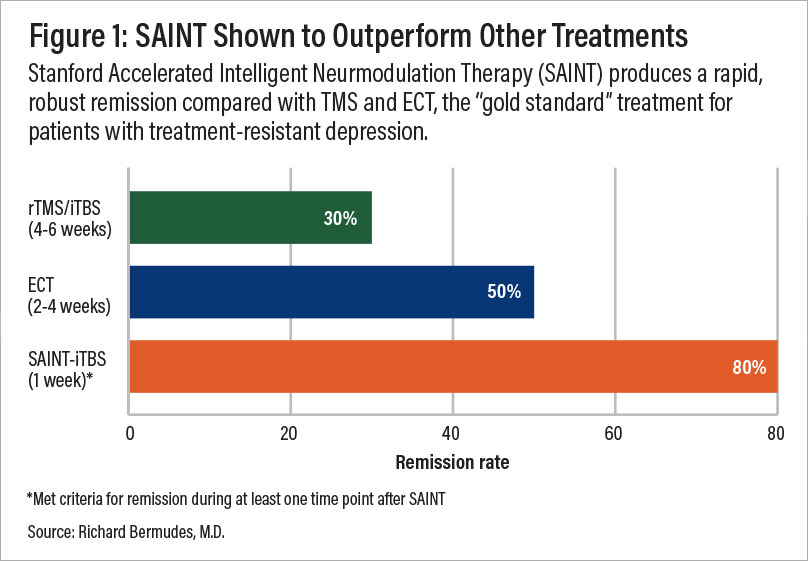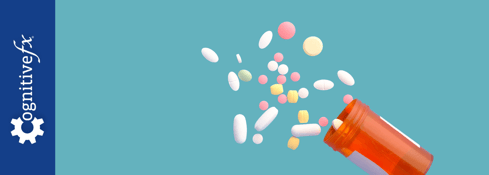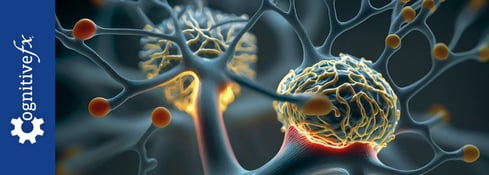Even if an SSRI helped at first, you might find that its effects have faded—or perhaps it never worked for you at all. If you have major depressive disorder and this sounds familiar, you’re not alone.
A reanalysis of the largest antidepressant study ever conducted found that only about one-third of patients experience lasting relief from antidepressant medications. Even after trying multiple drugs, two-thirds of patients still don’t find meaningful, long-term improvement.
In this article, we’ll explore why SSRIs sometimes fail to work as expected and what you can do next. We cover:
What Are SSRIs and How Do They Work?
Selective serotonin reuptake inhibitors (SSRIs) are the most commonly prescribed first-line antidepressant drugs. They’re often used for moderate to severe depression because they’re generally safe and have fewer side effects than older classes of antidepressant medication.
The Theory Behind How SSRIs Work
Researchers don’t know with certainty exactly how SSRIs work, but the theory is as follows:
Brain cells communicate using chemical messengers called neurotransmitters. One of these messengers is serotonin, which is thought to help regulate mood. Normally, when one neuron releases serotonin to send a signal, it reabsorbs the serotonin afterward in a process called reuptake.
In people with depression, it is hypothesized that this process doesn’t function properly. SSRIs are thought to block serotonin reuptake, allowing serotonin to linger between nerve cells longer, improving communication between mood-regulating brain regions.
SSRIs specifically target serotonin, unlike serotonin-norepinephrine reuptake inhibitors (SNRIs), which also affect norepinephrine.
Common SSRIs
- Citalopram (Celexa)
- Escitalopram (Lexapro)
- Fluoxetine (Prozac)
- Fluvoxamine (Luvox)
- Paroxetine (Paxil, Paxil CR)
- Sertraline (Zoloft)
- Vilazodone (Viibryd)
Common Side Effects
Nausea, dizziness, headaches, sleep disturbances, and mild weight gain are fairly typical early side effects. These often improve within a few weeks or can be reduced by adjusting the timing of your medication. For example:
- Take with food if it causes nausea.
- Take it in the morning if it causes insomnia.
- Take it at night if it causes drowsiness.
When SSRIs Don’t Work: Possible Reasons
1. You Fall Into the Two-Thirds of Patients for Whom Antidepressant Medications Have No Effect
The first potential reason why your SSRI medication isn’t working is that you may fall into the two-thirds of patients who don’t respond to any category of antidepressant medications.
In the 2022 reanalysis of the STAR*D study—the largest antidepressant medication trial to date—only 25% of participants achieved remission after 12 weeks on the SSRI citalopram. Switching to or combining other antidepressant medications provided minimal additional benefit.
The reasons for this lack of response aren’t fully understood. As mentioned above, our grasp of how these medications work remains theoretical. However, a plausible explanation for their ineffectiveness in some patients is that issues with the neurotransmitters they’re meant to affect (e.g., serotonin, dopamine, or epinephrine) may not be the source of their depression.
In these cases, considering alternative depression treatments (discussed below) that operate differently may provide a better chance of finding relief.
2. Your SSRI Isn’t the Right Biological Match
Even though all SSRIs aim to increase serotonin levels, they differ in how quickly they’re processed, how they interact with other medications, and how well they’re tolerated.
If one SSRI doesn’t work for you, another may. Your doctor may also try a different class of antidepressant medication, such as an SNRI or tricyclic antidepressant (TCA), which aims to act on additional neurotransmitters and may better match your brain chemistry.
3. Your Body Has Built Up Tolerance to the SSRI
Over time, your body may adjust to the medication, leading to antidepressant tachyphylaxis—a gradual loss of effectiveness. Up to 25% of people on long-term antidepressant medications experience this.
If you notice symptoms of depression returning, talk to your doctor. They may adjust your dosage or switch you to a medication that works differently.
4. Your SSRI Is Working, But Only Partially
Sometimes an SSRI helps “take the edge off” but doesn’t fully relieve symptoms. While this isn’t remission, it’s still progress—it can give you the energy and clarity to pursue complementary treatments like psychotherapy, which often leads to better long-term results.
5. You Missed Doses or Didn’t Take Your Medication as Prescribed
Like many patients, you've probably taken your SSRI late a few times, or even missed it altogether for a day or two. Although missing one dose is unlikely to have long-term effects, missing multiple doses can prevent SSRIs from working as well as they should or even prevent them from working at all.
Missing a few doses may also trigger antidepressant discontinuation syndrome, which may cause dizziness, headaches, and flu-like symptoms. Symptoms should improve quickly after patients restart taking the SSRI.
6. You’ve Experienced a Change In Life Circumstances
Significant stressors—such as losing a job or receiving a serious diagnosis—can make your medication feel less effective. You may need a dosage adjustment or additional therapeutic support during these times.
Other Factors That May Influence the Effectiveness of Antidepressants
-
Alcohol and substance use: Both can interfere with SSRIs, worsen depression, and increase side effects.
-
Aging: Older adults may experience more side effects and reduced effectiveness.
-
Pregnancy: Hormonal changes can alter SSRI effectiveness; never stop medication without guidance from your healthcare provider.
-
Initial improvement followed by decline: If you felt better immediately but improvements didn’t last, it might be due to the placebo effect, meaning the medication never truly worked.
-
New medications or health conditions: Drug interactions or new health issues can affect how SSRIs work.
-
Misdiagnosis: If depression is actually bipolar disorder or another condition, SSRIs may be ineffective or even harmful.
What to Do If Your SSRI Isn’t Working
If you feel like your current antidepressant medication isn’t working, don’t lose hope. You may need to work with your provider to adjust the dose, try a different type of antidepressant medication, or explore alternative treatment options.
Keep the following in mind:
Do Not Stop Abruptly
Never stop taking antidepressant medications abruptly without the support of your doctor. As described earlier, stopping your medication suddenly can trigger antidepressant discontinuation syndrome or severe side effects. Continue taking your medication, and consult your doctor before making changes.
Give It More Time
Antidepressants require anywhere from 6 to 8 weeks to become fully effective and for side effects to ease up. If you’re still within this trial period, be patient and try to give it at least 6 to 8 weeks. If you’re wavering, talk to your doctor.
Consult Your Doctor
If you feel your SSRI is still not working after 6 to 8 weeks, contact your doctor. They may recommend adjusting the dose, switching medications, or evaluating other contributing factors, such as new stressors or medical conditions.
It’s important to contact your mental health professional immediately if your symptoms suddenly worsen or if you experience any new, severe side effects, such as suicidal thoughts.
Try a Different Class of Antidepressant Medication
If you’ve already tried one or two SSRIs without success, your doctor may switch you to a different class (SNRI, TCA, or MAOI). If you’ve tried multiple antidepressant medications without relief, you may have treatment-resistant depression (TRD)—a condition that may respond better to a different type of antidepressant therapy.
Combine Medication with Psychotherapy
If medication provides partial relief, combining it with psychotherapy—such as Cognitive Behavioral Therapy (CBT)—is often more effective than either alone. Therapy helps patients process difficult experiences, challenge unhelpful thought patterns, and develop healthier coping strategies.
Alternative Treatment Options for Major Depression
To support the two-thirds of people for whom depression medications don’t work, researchers and clinicians are focused on developing safe, evidence-based, and effective treatment alternatives.
Some of the most common are transcranial magnetic stimulation (TMS), electroconvulsive therapy (ECT), ketamine (along with the variation Esketamine nasal spray), and vagus nerve stimulation (VNS)—all of which are FDA-approved for treating major depressive disorder.
We’ve written in-depth articles on each of these that discuss their effectiveness, risks, side effects, and more. You can find those here:
The Promising New Depression Treatment Offered at Our Clinic
At our Utah-based clinic, Cognitive FX, we offer a new form of TMS known as accelerated fMRI-guided TMS (a close alternative to the cutting-edge SAINT™ treatment).

A comparison of remission rates for rTMS/iTBS, ECT, and SAINT-iTBS.
The SAINT™ protocol (Stanford Intelligent Accelerated Neuromodulation Therapy) has demonstrated remarkable success rates: in a double-blind controlled clinical trial, 85% of patients responded and 78% achieved remission after just five days of treatment. However, it remains costly ($30,000–$36,000) and difficult to access.
Our Alternative: Accelerated fMRI-Guided TMS at Cognitive FX
We offer an accelerated fMRI-guided TMS protocol that combines the core strengths of SAINT—precision targeting and an accelerated treatment schedule—without the $30,000+ price tag.
Key differences from Magnus SAINT™ TMS:
-
We use advanced fMRI analysis by our neuroscientist and physician, rather than proprietary software, to determine the stimulation site.
-
We process scans in-house, leveraging 25 years of clinical fMRI experience from treating brain injury patients.
-
We pass those efficiencies on to patients: $9,000–$12,000 vs. $30,000+.
Of all the types of TMS available, this is the most targeted, safe, and effective protocol for patients with treatment-resistant depression.
Our TMS treatment is:
-
Safe: Non-invasive, outpatient care with mild, short-lasting side effects. Unlike SSRIs, there are no discontinuation symptoms when the treatment is completed and patients can just return to their daily activities.
-
Precise: fMRI and neuronavigation ensure accurate coil placement for every session.
-
Fast: A full treatment course completed in five days.
-
Effective: Among the best outcomes reported to date, especially when combined with cognitive behavioral therapy.
To improve outcomes for our patients, we also include cognitive behavioral therapy (CBT) as a part of our treatment. When combined with the traditional method of TMS (rTMS), CBT improved response and remission rates by ~8% and ~19%, respectively. Additionally, CBT is likely to produce sustained improvement over time once treatment has concluded.
Our personalized treatment is ideal for most patients with treatment-resistant depression. However, we do not treat patients under the age of 18 or over 65. Additionally, as a safety measure, we do not treat patients who have a history of seizures or who are currently actively suicidal and in need of crisis care.
Click here to learn more about receiving accelerated fMRI TMS therapy at Cognitive FX.
Cited Research











